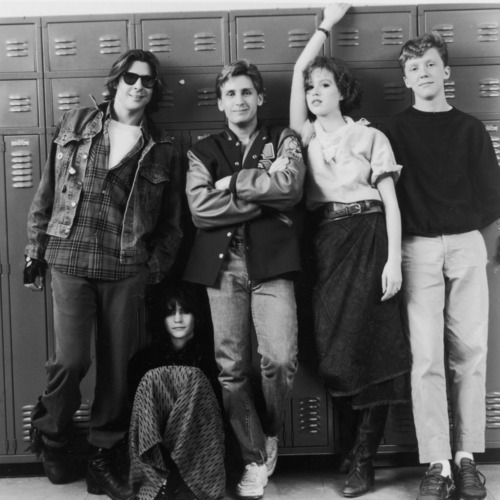At first the film seems to have little content, just showing kids messing around in a library. However as the film progresses each character begins to emerge and it seems that they have more in common than they previously thought. After destroying parts of the library, making trips about the school in secret and smoking cannabis, the students begin to open up about their lives behind closed doors and reveal their inner demons. Although from the outset you understand that all the students are to do a day in detention, you are never told why. The creativity of Hughes's script allows the viewer to continue to be gripped to the screen, longing to find out why the students, some of which have unsuspected behavioural problems, find themselves in detention.
As each student shares their problems with the rest of the group, the narrative begins to finally piece together. We learn that Andrew is easily influenced by others and is constantly concerned with his image and is hammered by pressure from his father to excel as a wrestler. Claire is worried over her status as a virgin and hates the fact she frequently finds herself in the middle of arguments between her divorced parents. Allison is a compulsive liar who is ignored by her parents and therefore struggles to fit in. Brain attempted suicide due to a bad grade he received and from the building pressure of his parents to achieve a high GPA. Finally, John is often subject to abuse from his father and watches his mother being beaten by him.
This film really does capture our hearts and minds as I'm sure we can emphasise with at least one of the characters and their daily struggles. But what message is Hughes's attempting to portray in this film? Ultimately these five students act as a microcosm of western society. Each individual is a stereotype and placed into a certain clique, which is consequently echoed in society when people are placed in to a group due to their distinctive traits, talents or wealth.
What can we learn from 'The Breakfast Club'? We learn that it is incorrect to judge anyone on their appearance. By the end of the film Brian completes the task set by the principal to write an essay on 'who they think they are'. Brian adequately answers this question in simple terms that no matter who he thinks he is, he will still be judged in the eyes of others as a stereotypical geek. This certainly made me reflect on these words, and led me to believe this is entirely true. People who do not know definitely judge you on your appearances, which is now elevated through social media. Additionally, this film teaches us that everyone deserves a second chance. When Andrew first meets Allison he, as we all do, judges her on her appearances and social behaviour. The last thing he does is consider her as a romantic interest. By the end of the film, once barriers between the characters are dissolved, Allison allows Claire to give her a make over. Struck by her revealed beauty, Andrew totally changes his mind and ends up kissing Allison at the end of the film.
This film is ingenious in many ways but particularly as it is set in one day and in one room. Hughes's exceptional script has helped it develop in to one of the best films ever made which is still relevant today. Some people believe that brilliant films are defined by amazing graphics, famous actors or packed with plenty of action. Although these types of films are often great, its the films that offer a didactic message and connect emotionally with the viewer that are my favourite. For me, 'The Breakfast Club' is one of the best realist films of the 20th century, along with When Harry Met Sally of course.



No comments:
Post a Comment